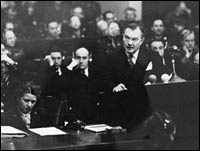Sweeping Views of Justice
While death camp officers and execution squads were obvious candidates for any war crimes tribunal, American prosecutors, led by Justice Robert Jackson, had a more sweeping view of justice in mind. They saw the supreme crime at Nuremberg not in any specific act of Nazi mass killing, nor in the construction of the death camps like Auschwitz. For American prosecutors, the supreme crime was a completely new criminal charge: waging aggressive war, or the crime against peace.

Justice Robert Jackson of the United States opens the trial. Photo: USHMM |
At the opening of the first Nuremberg trial, Justice Jackson distinguished between legitimate defensive wars and aggressive wars like the Nazi conquests in Europe. Jackson said: "Any resort to (aggressive) war, any kind of war is a resort to means that are inherently criminal as means. War inevitably is a course of killings, assaults, deprivations of liberty and destruction of property."
Nuremberg was a first: prosecuting not only top leaders, but the inner workings of a country's war machine.
But Benjamin Ferencz says prosecutors knew that one trial of 21 Nazi leaders did not adequately address criminal guilt in Germany. "It was felt that we had to bring in the industrialists, who built the concentration camps in order to have cheap labor for their war machine. The generals, who had the power to stop Hitler and chose not to. The doctors, who conducted medical experiments for example, were to be portrayed so the world could see precisely how it was that a civilized country like Germany could resort to such barbarism. That was the purpose of the subsequent trials."
For William Caming, another American lawyer at Nuremberg who would help prosecute German diplomats and other government officials, the trials had another aim.
Caming says: "There was also the hope that the trials and the revelation of all of the acts would reeducate the German people who had lived under the yoke of Nazism since the early 30s."
Next: Accusing Prominent Businessmen and Professionals 

